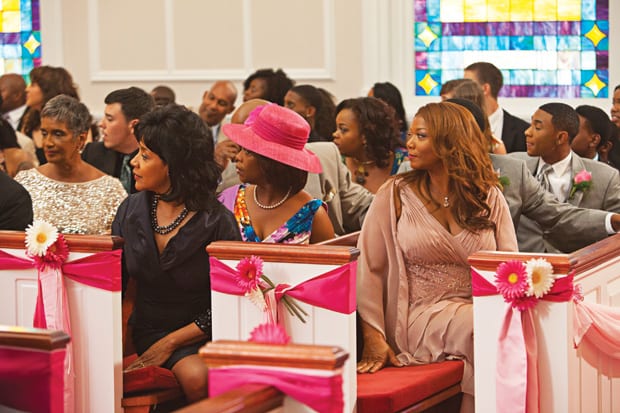Lifetime’s updating of ‘Steel Magnolias’ with a black cast hits the highlights

BLUSH AND BASHFUL | Pink is the signature color at the wedding of Shelby, witnessed by Clairee (Phylicia Rashad), Ouiser (Alfre Woodard) and mom M’Lynn (Queen Latifah).
ARNOLD WAYNE JONES | Life+Style Editor
It’s been 23 years since Steel Magnolias became every gay boy’s fempowering camp tearjerker classic, and in that time all that’s changed is cell phones and references to Beyonce and Spanx. Oh, and everyone’s black. OK, so maybe that’s a big change.
Lifetime’s updated TV movie version of Steel Magnolias with an African-American cast (led by Queen Latifah) says it is “based on the play by Robert Harling,” but for most of its running time, it’s really based on the 1989 chick flick. The play was something of a chamber piece, set entirely in Truvy’s backyard beauty parlor, with six women sharing their lives with snarky Southern charm. Like its predecessor, this version opens that up, keeping the men who were only spoken of, never seen, as actual characters and moving us out of the salon. (What would have been really daring would be to put it in a barbershop with all gay black men — that would be something.) That means we see Shelby’s adorable little boy (the one she should never have given birth to), we meet Truvy’s layabout husband, we attend the pink-explosion wedding and a doleful funeral. Only at the end, when adaptation writer Sally Robinson moves the climax from the cemetery back to Truvy’s does it fully return to its roots (and a lady always looks after her roots).
 And yet, with full 40 minutes trimmed from the runtime, this Steel Magnolias trots along — no longer do we see Clairee (Phylicia Rashad) calling a ballgame over the radio, or spend time with Annelle (Adepero Oduye) on a date with her boyfriend. We also lose some of the classic lines. (Unless I missed ‘em, I didn’t hear “he has the penmanship of a cereal killer” or “what sets us apart from the animals is our ability to accessorize”). Still, the edits work by streamlining the extraneous — doing a remake could be considered a boondoggle anyway, so why cleave to every detail? (Well, the answer to that is, because it’s part of what people have come to love about the original. But if the only change was the race of the cast, why do it at all?) Still, what it does stick to is important: Although mawkish to the extreme, it’s a sure-fire way to get yourself to cry on command. It’s almost Pavlovian.
And yet, with full 40 minutes trimmed from the runtime, this Steel Magnolias trots along — no longer do we see Clairee (Phylicia Rashad) calling a ballgame over the radio, or spend time with Annelle (Adepero Oduye) on a date with her boyfriend. We also lose some of the classic lines. (Unless I missed ‘em, I didn’t hear “he has the penmanship of a cereal killer” or “what sets us apart from the animals is our ability to accessorize”). Still, the edits work by streamlining the extraneous — doing a remake could be considered a boondoggle anyway, so why cleave to every detail? (Well, the answer to that is, because it’s part of what people have come to love about the original. But if the only change was the race of the cast, why do it at all?) Still, what it does stick to is important: Although mawkish to the extreme, it’s a sure-fire way to get yourself to cry on command. It’s almost Pavlovian.
The performances, while generally not as memorable as that notorious cast, more than stand on their own. Queen Latifah is an unexpected choice to play M’Lynn, the long-suffering mother of diabetic newlywed Shelby (Condola Rashad), but she more than acquits herself. Mom Phylicia lacks Olympia Dukakis’ devilishness but captures the character’s droll humor. (Oduye is actually an improvement over Darryl Hannah, and while that’s not saying much — Hannah was terrible — the part suits her well.)
But the scene-stealer is Alfre Woodard as the curmudgeonly Ouiser. Woodard is already one of our best film actresses, something she proves time and again even in lesser films.
Here, she makes you forget about Shirley MacLaine. That’s saying something.
This article appeared in the Dallas Voice print edition October 5, 2012.

